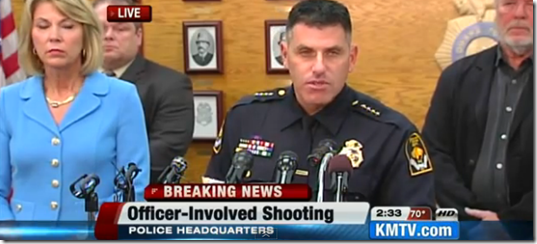A Perfect Example Of A Great Press Conference
Last week, an audio technician for the television program Cops was killed by friendly fire while filming a robbery at a Wendy’s in Omaha, Nebraska.
The Omaha police chief, Todd Schmaderer, delivered an almost perfect press conference—one that stands in marked contrast to the shameful media interactions in Ferguson, Missouri—that should be studied by PR professionals as a terrific example of how to communicate in crisis.
PR pro Dave Statter, who writes the excellent STATter911 blog (and wrote about this story first), called this “one of the most effective and timely presentations following a police involved shooting I’ve witnessed.” He’s right.
Chief Schmaderer did many things right in this press conference. Below, you’ll find the five things that stood out to me most.
1. He Struck The Perfect Emotional Tone
Chief Schmaderer spoke in human terms throughout the press conference, saying, “It’s as if we lost one of our own…the tears and the hugs that I got when I got to the hospital, I could feel the pain of the officers.”
When asked whether he regretted his decision to allow Cops to film in Omaha, he gave a genuinely reflective answer, one that indicated that he had spent some time agonizing about that question: “Personally, I’ll have to live with this forever.”
In a particularly classy move, he expressed condolences not only to the Cops production member who was killed, but to the family of the suspect, who was also killed during this incident.
2. He Treated The Media As An Ally
Chief Schmaderer treated the media with complete respect—and in return, the press treated him with complete respect. He also set the rules up front, asking reporters to identify themselves, instructing them to speak loudly enough for the microphones to pick up their questions, and letting them know he intended to begin with local reporters.
When he inadvertently skipped a reporter, he expressed remorse: “I want to make sure the Omaha World-Herald gets a question, I can’t believe I forgot you Maggie, I’m so sorry.”
3. He Was Completely Open
Early in the press conference, the Chief said that, “We are striving for unprecedented transparency in this incident.” He lived up that pledge, giving an extended opening statement filled with specific detail and answering every question directly.
When he was unable to answer a question due to the legal process, he used a technique I call commenting without commenting: “While I can’t show the video—it’s evidence and it’s needed for the Grand Jury—we did provide still photos to show what the officers had encountered to the best of our ability.”
4. He Got In Front Of a Potential Controversy
The suspect who was killed by the officer’s bullet(s) was carrying an Airsoft Gun which, according to Wikipedia, is a replica “designed to be non-lethal.” Chief Schmaderer appeared to be aware that headlines could read something like, “Suspect With Fake Gun Killed By Police,” so he showed photos of that replica gun to make clear that responding officers had no way of knowing whether or not it was real.
5. He Conveyed a Sense of Complete Competence
Chief Schmaderer’s tone-perfect performance gave me—and likely many other people—confidence that he’s the right person to lead this investigation professionally.
That leads to an important point about crisis press conferences: Press conferences often serve as a proxy for how competent a spokesperson is not only as a communicator, but behind the scenes as a leader. Leaders who are great at the behind the scenes portion of their jobs—but who are not great public communicators—may be perceived as lousy leaders. Chief Schmaderer, on the other hand, earned the benefit of the doubt and, as Dave Statter wrote, will “ultimately have a positive impact on the reputation of the Omaha Police Department.”




The chief certainly did a great job, but I was less impressed with the two production guys. Yes, they seemed genuine, but they talked over each other and it gave me the impression that they weren’t in sync. The younger guy also did not seem comfortable and didn’t instill much confidence. Minor thing, yes. But IMO they should have designated one person to speak on the production company’s behalf.